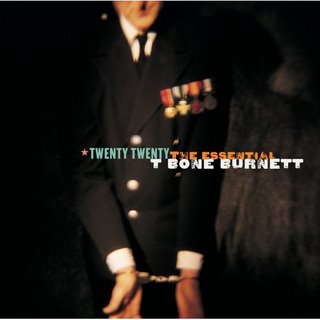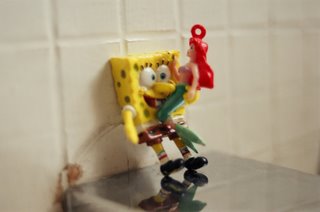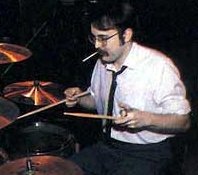
With the release of this "best of" collection, Mr. J. Henry Burnett finds himself in a spot where he can neither win nor lose. His fanbase has built slowly and steadily, primarily through word of mouth (or the lost art of the mixed tape). His creative output, sporadic right from the start, slowed to the point where his faithful listeners wondered if he'd maybe packed it in for good. But here we are, 13 years after his last CD: he's released
The True False Identity to raves (including
my own), and offered a two-disc selection of "essential" songs from his past.
Burnett's ouevre commands some the same critical reverence that Bob Dylan's does, while his output comes in at a tiny fraction of The Man's. Thus, T Bone fans -- let's call them "Bone-heads", shall we? -- have of necessity formed the habit of snapping up everything thrown their way, including a package of songs from albums they already own -- T Bone can't lose. However, thanks to this same paucity of output, there isn't a milisecond of recorded sound that Bone-heads haven't committed to intimate memory. Fudge with any of it -- and T Bone has -- and you can't possibly win.
Twenty Twenty was purchased by a number of fans still waiting for a CD reissue of Burnett's seminal 1983 album,
Proof Through The Night. There are fans who consider this album a masterwork of collaborative genius --
Rolling Stone deemed it the best album of '83 (back in an era when its opinion of these things still mattered). My own reaction to
Proof was and remains mixed -- I would have preferred more songs from the
Trap Door EPs and fewer from
Proof or
Talking Animals, but nevermind. T Bone's perspective on his own music is naturally of interest to the attentive listener -- and we Bone-heads are nothing if not resolutely attentive. So let us insert the discs into our players, turn up the volume and attend.
The track listing is reminiscent of the same scattered consciousness that informed Dylan's three-disc
Biography -- chronological order is eschewed in favour of something more aesthetic. The first offering from
Proof -- "Fatally Beautiful" -- comes in at number four. When I first heard it, I wasn't sure if this was the original track from the album, with just a few minor tweaks, or if I was listening to something entirely new. I tabbed back and listened again, but the jury was still out.
After hearing all 40 songs, I'm fairly certain Burnett went back to the studio and re-recorded, right from scratch, every single one of the
Proof selections. This can't help but stir up conflict for the listener: personally, I rather liked the re-jigging of the zany "Hula Hoop", a song that now has added sheen and bouyancy; but I disliked the changes to "When The Night Falls", which seems to have lost Ry Cooder's note-bending tension. The fact that
Proof is the only album to receive this treatment makes me wonder if T Bone's rights to the source material aren't inextricably enmeshed. The heavyweights of the day showed up at the studio, back in '83 -- perhaps there's some legal complication involved in presenting the tracks as they once existed?
I'm not especially offended by this approach, but judging by the
Amazon comments, there are listeners who are: "The re-recorded
Proof Through The Night tracks are a crime" (one star); "That the originals were superior should be obvious to anyone: much of the bite and snarl, the snap and poetic power are just gone" (three stars); "The alternate versions on Twenty twenty just dont make it ... Too bad, this collection had great potential" (three stars); "Burnett has committed the unforgivable sin of re-recording the tracks from his best album ... BIG MISTAKE" (two stars) -- geez, you'd think we were talking about
Star Wars!
My own take: I like the set. There's a spicy essay supplied by Bill Flanagan, and Burnett brings commentary to each and every song, some of it very enlightening indeed. Again, I think comparing it to Dylan's
Biography is appropriate. It's a mixed and re-mixed bag of tricks. Played from beginning to end, it carries its own strange sense of narrative. And once you've ingested it a few times, you'll find yourself skipping over songs you were never crazy about to begin with; you'll also find yourself listening to others you once dismissed.
As for all this disappointed fan vitriol, I would think the easy corrective would be to re-release his entire catalogue. It's the
Trap Door albums I'm after, but even so, I'd lay down money for
Proof and
Animals, too. Sony might not want to do this just yet, however. Burnett fans are too used to waiting a long, long time for what they want -- too much at once might ruin our sense of anticipation and interrupt our on-line conversation.
Tags:
T Bone Burnett Twenty Twenty CD review














